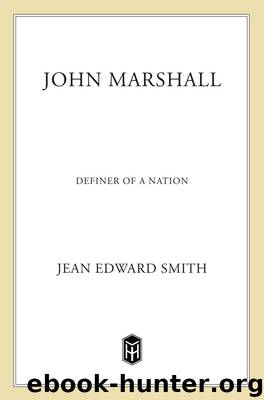John Marshall by Jean Edward Smith

Author:Jean Edward Smith [Smith, Jean Edward]
Language: eng
Format: epub
Publisher: Henry Holt and Company
Published: 0101-01-01T00:00:00+00:00
19
Steamboats
MARSHALL’S OPINION in McCulloch immediately drew national attention. Newspapers throughout the country published the text in full.1 In the North and East, where the bank was still popular and the recession less severe, the decision drew substantial support. Webster wrote Story that the opinion was “universally praised. Indeed, I think it admirable. Great things have been done at this session.”2 The Boston Daily Advertiser called the decision “one of the most able judgments ever delivered.”3 The National Intelligencer, reflecting the views of the Monroe administration, said “The Supreme Judicial authority of the Nation has rarely, if ever, pronounced an opinion more interesting in its views or more important as to its operation.”4
Reaction in the South and West was mixed. A leading Georgia paper hailed the decision as “a very interesting adjudication” and said that the struggle between the national and state banks should continue until one or the other was rooted out. “In such a struggle, we should hope, as the least of two evils, that the Bank of the United States should prevail, for in banking, as in government, one tyrant may be better endured than two or three hundred.”5 The Kentucky Gazette wrote, “This interesting decision cannot be too highly appreciated, and it will furnish a happy lesson to local politicians against their right to infringe upon the National Constitution or upon the laws of Congress. We hope to see no more interference by State Legislatures.”6 On the other hand, a Mississippi newspaper said, “The last vestige of the sovereignty and independence of the individual States composing the National Confederacy is obliterated at one fell sweep.”7 Niles Weekly Register in Baltimore, partially reflecting wounded state pride, delivered a series of attacks on the decision, calling it “a total prostration of State-Rights and the loss of the liberties of the Nation.… A deadly blow has been struck at the Sovereignty of the States, and from a quarter so far removed from the people as to be hardly accessible to public opinion.… Nothing but the tongue of an angel can convince us of [the decision’s] compatibility with the Constitution.”8
Opposition was fiercest in Virginia. The Richmond Junto,* the powerful Republican clique that dominated politics in the Old Dominion, were still smarting over the rebuke given the Virginia court of appeals in Martin v. Hunter’s Lessee three years earlier.9 The decision in McCulloch v. Maryland rubbed salt in the wound. These men were Marshall’s neighbors: Thomas Ritchie, editor of the Richmond Enquirer, the state’s most influential newspaper; Judge Spencer Roane, the most outspoken defender of state rights on the court of appeals; and William Brockenbrough, a judge of the Virginia general court who was Roane’s first cousin. Ritchie lived one block away, Brockenbrough two, and Roane’s substantial property abutted Marshall’s on the east, separated symbolically by a deep gulley. They moved in the same social circles as the chief justice, their children had been playmates, and they had known one another for at least thirty years.10 They were also political rivals of long standing.
Download
This site does not store any files on its server. We only index and link to content provided by other sites. Please contact the content providers to delete copyright contents if any and email us, we'll remove relevant links or contents immediately.
Fanny Burney by Claire Harman(25790)
Empire of the Sikhs by Patwant Singh(22184)
Out of India by Michael Foss(16315)
Leonardo da Vinci by Walter Isaacson(11915)
Small Great Things by Jodi Picoult(6108)
The Six Wives Of Henry VIII (WOMEN IN HISTORY) by Fraser Antonia(4798)
The Wind in My Hair by Masih Alinejad(4427)
The Lonely City by Olivia Laing(4124)
The Crown by Robert Lacey(4113)
A Higher Loyalty: Truth, Lies, and Leadership by James Comey(4038)
The Iron Duke by The Iron Duke(3650)
Millionaire: The Philanderer, Gambler, and Duelist Who Invented Modern Finance by Janet Gleeson(3575)
Sticky Fingers by Joe Hagan(3456)
Alive: The Story of the Andes Survivors by Piers Paul Read(3320)
Papillon (English) by Henri Charrière(3279)
Joan of Arc by Mary Gordon(3269)
Stalin by Stephen Kotkin(3090)
Aleister Crowley: The Biography by Tobias Churton(3026)
Ants Among Elephants by Sujatha Gidla(2928)
